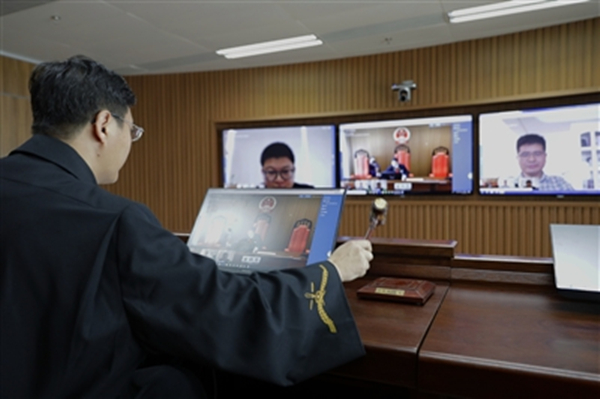
From the People's Daily App.
This is Story in the Story.
With the nature of police work in China changing as technology plays a bigger role in criminal investigations, legal professionals are calling for more training for forensic and high-tech talent.
Ji Chunwei, a criminal lawyer from Guangdong province who used to be a policeman, said the number of labs or centers for studying and applying technology in criminal investigations has risen over the past five years.
"Chinese police have realized the importance of applying technology in cracking criminal cases and have also shown their willingness to brush up on the latest technologies," said Ji, who was a police officer from 2000 to 2014.
He said most public security bureaus, including the one he worked for, used to be more focused on clues such as fingerprints and footprints during investigations. However, "now they have begun using more big data and video surveillance as electronic evidence."
Today’s Story in the Story looks at how big data and video surveillance is being used to help solve crimes in China.

The plaintiff, defendant and judges connect to each other by video during the first court session of the Guangzhou Internet Court on Oct 25, 2019. (Photo: court.gov.cn)
"DNA comparison has helped police increase the probability of catching fugitives because the technology is accurate and highly sensitive," Ji said.
Big data, video surveillance, artificial intelligence and psychological tests are also being used more frequently in dealing with new types of crimes, said Liao Ming, an associate law professor at Beijing Normal University.
"Taking advantage of technologies to offend is common nowadays, such as those using the internet and telecommunications to defraud others," he said.
"If police cannot become more capable of applying technology in criminal investigations, they will find it difficult to fight high-tech offenses."
Hubei's provincial Public Security Bureau said it handled 271 homicide cases last year, all of which had been solved. DNA comparison and big data were used to solve 39 of them.
"Public security authorities at the county and city levels in Hubei have established DNA labs or big data databases one after another, improving the integration of criminal case information and helping us accurately identify missing people or dead bodies," the bureau said in a statement.
Liao said, "As it shortens investigators' time in cracking criminal cases, the application of technology as a major way to obtain physical evidence can also reduce the use of coercive measures in interrogations to prevent wrongful arrests and to correct miscarriages of justice in investigations."

Companies such as Apple, Qualcomm, Oracle, SAP, Alibaba, Tencent and Huawei have set up operations in Guizhou Province, southwest China. (Photo: CGTN)
But the technologies should not be abused because that could lead to a lack of trust in identification results.
"The regulated application of technologies will better ensure accuracy and efficiency in criminal investigations," Liao said.
Ji also urged public security bureaus across the country to better regulate the DNA comparison process.
"If the procedures cannot be standardized, the results will not be accurate or become more easily tainted," he said.
"Some police officers from grassroots-level public security bureaus didn't wear medical gloves, masks or caps when collecting DNA at crime scenes, which negatively influenced comparison results."
Liao and Ji suggested the country intensify efforts to train forensic and high-tech talent.
Ji said criminal investigation has always been a major in police colleges.
"But what we urgently need is interdisciplinary talent, or those who are not only familiar with investigation, but also good at the internet, computing or biology," he said.
Police colleges should work with other universities to train such talent, and public security departments should offer technological training for police officers, he said.
In a recent commentary, Nature, a weekly international journal, concluded that China "has transformed from a low-cost manufacturing base to a center of knowledge creation." This progress is best exemplified by the country's development of the big data industry.
A report by the International Data Corporation (IDC) predicts that by 2023, China's big data market will be worth almost $22.5 billion. The report states the sector will continue to achieve steady expansion, driven by policy support and technology integration.
(Produced by Nancy Yan Xu, Brian Lowe, Lance Crayon and Da Hang. Music by bensound.com. Text from China Daily and CGTN.)


